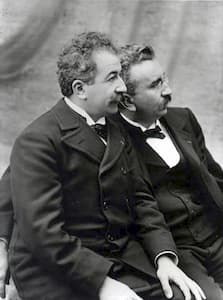
Auguste and Louis Lumière
I am just an ordinary city girl, and one of the greatest joys during the burning hot day of summer is a visit to my local cinema. Sitting in a comfy chair in a chilled air-conditioned room with a huge bag of popcorn in my hand while I look at a giant screen and listen to beautiful music on surround sound is one of my greatest joys. I certainly prefer it to looking at my computer or TV screen at home, with my mother or siblings interrupting me all the time. So I decided to write a little blog on the greatest composers of film music, and I’ll start with a bit of trivia.
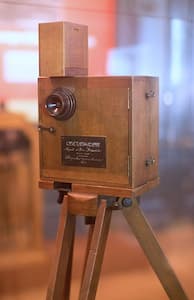
Cinématographe
Do you know what extraordinary event took place in Paris on 28 December 1895? I give you a little hint by telling you that it involved the brothers Auguste and Louis Lumière. Maybe you know that the Lumière brothers were manufacturers of photography equipment, best known for their Cinématographe motion picture system. On that specific day in 1895, in what is considered the birth of cinema, they showed a series of short films to a Parisian audience. Even more remarkable is the fact that a pianist improvising on popular tunes accompanied this first screening.
Show Girl (Exceprt)
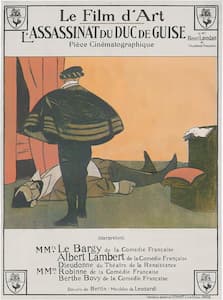
L’Assassinat du duc de Guise
It seems a bit funny, but the so-called silent film era wasn’t silent at all, but included music to establish a mood. As literally thousands of movie theaters sprang up in Europe and the United States, the solo piano was the most common instrument for musical accompaniment. “In a number of theaters, a percussionist was added to create special effects, and soon special theatre organs were built to produce a wide range of musical colors and effects, including gunshots, animal noises, and traffic sounds.” Larger theaters were known to feature ensembles, including chamber orchestras and occasional singers. We also know that the music played during screenings generally fell into three different types; borrowings from Classical music, arrangements of well-known popular, patriotic, or religious tunes, and newly composed music. Here then is the second trivia for today. Do you know who is generally credited with composing the first original film score? The answer is Camille Saint-Saëns, who wrote original music for the film “L’Assassinat du duc de Guise” (The Assassination of the Duke of Guise) in 1908.
Camille Saint-Saëns: “L’Assassinat du duc de Guise,” Op. 128
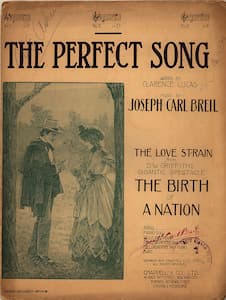
Sheet music of “The Perfect Song” from
The Birth of a Nation
For our next trivia question we turn to the United States and “the most controversial film ever made in the United States,” also called “the most reprehensibly racist film in Hollywood history.” The silent film in question was called “The Birth of a Nation” and featured a plot, part fiction and part history, that chronicles the assassination of Abraham Lincoln and the relationship of two families in the Civil War and Reconstruction eras. While Abraham Lincoln is portrayed positively, as a friend of the South, the film “has been denounced for its racist depiction of African American. The film portrays them, many of whom are played by white actors in blackface, as unintelligent and sexually aggressive toward white women. The Ku Klux Klan is portrayed as a heroic force, necessary to preserve American values, protect white women, and maintain white supremacy.”
Birth of a Nation (1915) Trailer
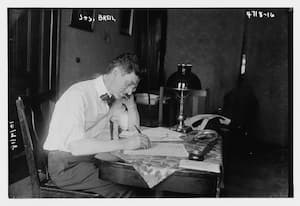
Joseph Carl Breil in 1918
It’s all pretty horrible and makes me cringe, and some critics say that it “caused an entire century of racism.” However, the reason I decided to feature this particular film in this blog has nothing to do with the subject. Rather, it seems that the director D.W. Griffith “elevated cinema to an art form with this classical Civil War spectacle, and Joseph Carl Breil composed a three-hours-long landmark score that featured music by Richard Wagner, patriotic tunes for the Civil War scenes, “and new music featuring a number of leitmotifs to accompany the appearance of specific characters.” “The Perfect Song” is regarded as the first marketed theme song from a film, with critics calling the score “a mix of Dixieland songs, classical music and vernacular heartland music; an early, pivotal accomplishment in remix culture.”
The Birth of a Nation “The Perfect Song”
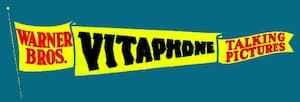 As in other eras of life, technology changed everything in the film industry. The introduction of the “Vitaphone” in 1926 was nothing short of a revolution. Vitaphone was actually a sound film system, with the soundtrack not printed on the film itself, but issued separately on phonograph records. The sound disk would be played on a turntable physically coupled to the projector motor while the film was being projected. And it was Warner Bros. Studio that unveiled that system in the feature film Don Juan. That particular film sounded music performed by the New York Philharmonic. A number of additional films employing synchronized background music were quickly released, but it was isolated passages of spoken words that really created the sensation. Talking pictures rapidly displaced silent films. As with many new technologies, it wasn’t all smooth sailing. It turned out to be really difficult to coordinate music and dialogue, and for a while, the spoken word prevailed. However, technology quickly found solutions and Hollywood entered into a “Golden Age,” with music once more a central feature of film.
As in other eras of life, technology changed everything in the film industry. The introduction of the “Vitaphone” in 1926 was nothing short of a revolution. Vitaphone was actually a sound film system, with the soundtrack not printed on the film itself, but issued separately on phonograph records. The sound disk would be played on a turntable physically coupled to the projector motor while the film was being projected. And it was Warner Bros. Studio that unveiled that system in the feature film Don Juan. That particular film sounded music performed by the New York Philharmonic. A number of additional films employing synchronized background music were quickly released, but it was isolated passages of spoken words that really created the sensation. Talking pictures rapidly displaced silent films. As with many new technologies, it wasn’t all smooth sailing. It turned out to be really difficult to coordinate music and dialogue, and for a while, the spoken word prevailed. However, technology quickly found solutions and Hollywood entered into a “Golden Age,” with music once more a central feature of film.
Don Juan, 1926 (Excerpt)
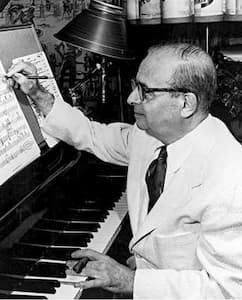
Max Steiner
Having solved the technical problem of synchronizing moving pictures with sounds, “film were produced at an unprecedented rate, and Hollywood initially called on the services of the Viennese composer Max Steiner (1888-1971), often called the “father of film music.” Steiner was a child prodigy who conducted his first operetta at the age of twelve and he became a full-time music professional, either composing, arranging, or conducting at the age of fifteen. How talented was this boy, you rightfully ask? Well, he enrolled in the Imperial Academy of Music in 1904, and with private tutoring by Gustav Mahler, completed a four-year course in only a single year! Steiner traveled between Britain and Europe to work on theatrical productions, but with the beginning of World War 1 he was arrested as an enemy alien. Fortunately he had some connections, and he obtained exit papers to go to America. He arrived in New York City in December 1914 without money and without the prospect of a job. His talents, however, did not go unnoticed and he was quickly employed and worked for fifteen years as “a music director, arranger, orchestrator, and conductor of Broadway productions.”
Max Steiner: King Kong Music Suite (Max Steiner, cond.)
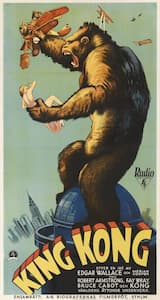
King Kong
Steiner started his career as a film composer with RKO Pictures in Hollywood, and he “pioneered the use of original composition as background scoring for films.” In fact, Steiner was among the first to acknowledge the need for original scores in films. He thought that knowing when to start and stop the music was the hardest part of scoring, since incorrect placement of the music can speed up a scene meant to be slow and vice versa. “Knowing the difference,” he writes, “is what makes a film composer. I’ve always tried to subordinate myself to the picture. A lot of composers make the mistake of thinking of film as a concert platform on which they can show off. This is not the place. If you get too decorative, you lose your appeal to the emotions. My theory is that music should be felt rather than heard.”
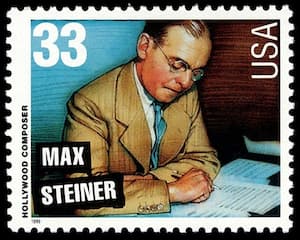 Steiner’s breakthrough score was King Kong of 1933. It represented a paradigm shift in the scoring of fantasy and adventure films. “The score was an integral part of the film, because it added realism to an unrealistic film plot.” Steiner’s score, constructed on the principle of the Wagnerian leitmotif, showed how music could manipulate audience emotions. Steiner was predictably proud of his composition, and before he died, he admitted that King Kong was one of his favorite scores.
Steiner’s breakthrough score was King Kong of 1933. It represented a paradigm shift in the scoring of fantasy and adventure films. “The score was an integral part of the film, because it added realism to an unrealistic film plot.” Steiner’s score, constructed on the principle of the Wagnerian leitmotif, showed how music could manipulate audience emotions. Steiner was predictably proud of his composition, and before he died, he admitted that King Kong was one of his favorite scores.
Max Steiner: Gone with Wind (Soundtrack Suite)
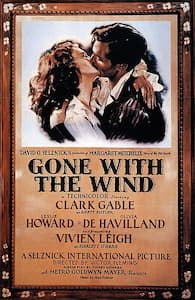
Gone With the Wind
Composing the score to King Kong made Steiner one of the most respected names in Hollywood, and after composing a number of important works he scored his masterpiece with Gone With the Wind of 1939. For this epic film of love and war, Steiner wrote three hours and forty-five minutes of music. “The leitmotif for Scarlett’s plantation, known as “Tara’s theme” became the first blockbuster film theme and remains one of the most popular and recognizable of all movie melodies.
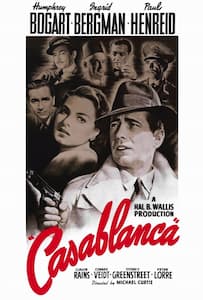
Casablanca
Steiner explained his own typical method of scoring, “When a picture is finished and finally edited, it is turned over to me. Then I time it: not by stopwatch, however, as many do. I have the film put through a special measuring machine and then a cue sheet created which gives me the exact time, to a split second, in which an action takes place, or a word is spoken. While these cue sheets are being made, I begin to work on themes for the different characters and scenes, but without regard to the required timing. During this period I also digest what I have seen, and try to plan the music for this picture. There may be a scene that is played a shade too slowly which I might be able to quicken with a little animated music; or, to a scene that is too fast, I may be able to give a little more feeling by using slower music. Or perhaps the music can clarify a character’s emotion, such as intense suffering, which is not demanded or fully revealed by a silent close-up.”
In all, Steiner worked on over three hundred films including such memorable scores as Casablanca, Since you Went Away, The Charge of the Light Brigade, and The Treasures of the Sierra Madre while receiving countless Academy Award nominations. There can be no doubt that Steiner is one of the greatest composers of film music, ever.
Max Steiner: Casablanca Suite
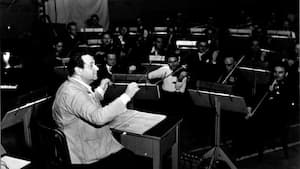
Erich Wolfgang Korngold
Max Steiner was joined in Hollywood by another fabulous Viennese composer, Erich Wolfgang Korngold (1897-1957). When Max Reinhardt, one of the most prominent directors of German-language theatre in the early 20th century was working on a production of Shakespeare’s play “A Midsummer Night’s Dream” for Warner Brother in 1934, he put Korngold in charge of the musical scoring. Reinhardt and Korngold had previously collaborated on a number of highly successful productions in Vienna, and Korngold arrived in Hollywood on 31 October 1934. It was agreed that the incidental music composed by Mendelssohn would be used as a background score, and Korngold reported on his unique approach to that particular challenge.
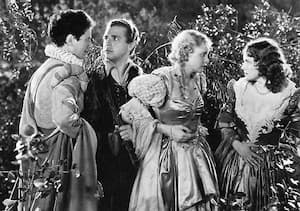
A Midsummer Night’s Dream, 1935
“I had to make preliminary recordings—the so-called playbacks—of Mendelssohn’s Scherzo and Nocturne, which were relayed over huge loudspeakers during the actual filming of the ballet episodes. Further, I conducted the orchestra on stage for complicated simultaneous ‘takes’ and lastly, after the film was cut, I conducted a number of music pieces, which were inserted in the completed picture as background music. In addition, however, I had to invent a new method, which was a combination of all three techniques, for the music that accompanied the spoken word. I wrote out the music in advance, conducted—without orchestra—the actor on the stage in order to make him speak his lines in the required rhythm and then, sometimes weeks later, guided by earphones, I recorded the orchestral part.”
Erich Wolfgang Korngold: Mendelssohn – “A Midsummer Night’s Dream” (Celina Lindsley, soprano; Michelle Breedt, soprano; Scot Weir, tenor; Michael Burt, bass; Berlin Radio Choir; Berlin Symphony Orchestra; Gerd Albrecht, cond.)
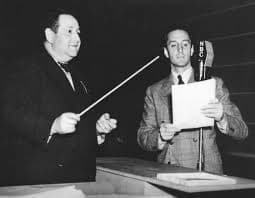
Korngold in 1938, during the recording for
The Adventures of Robin Hood
A scholar writes, “from the beginning, Korngold’s approach to scoring this film was operatic, as he tailored his score to the drama and the abilities and talents of the actors.” Korngold knew that it would take considerable adaptation and additional music to finish the project. So he freely used music from other Mendelssohn works, carefully woven into the musical fabric, and also ingeniously expanded the original score with what Reinhardt called “padding.” Korngold also adopted a system of leitmotivs for individual characters and situations to respond to the emotional level of a scene. Over the next four years, Korngold was involved in various Hollywood collaborations, and by March 1938 “his ongoing relationship with Warner Brothers saved his life when the Nazis invaded Austria.”
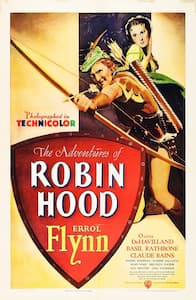
The Adventures of Robin Hood
At that time, he was again in Hollywood, scoring “The Adventures of Robin Hood.” Korngold always “credited Max Reinhardt with saving his life and indeed, the lives of his family.” Andre Previn candidly wrote, “Korngold was a master film composer. His wonderful melodies, orchestrated in the most gorgeous Richard Strauss-oriented manner, are a joy to hear, even when the films are forgettable.” Korngold always intended his scores to function independently from the moving image, and to be equally effective on the silver screen and in the concert hall. Korngold was a master of orchestral color and thematic development, and he provided a model for future film composers. In terms of film music, Korngold was a giant! In our next episode we look towards France and film music composed by Satie, Ibert, Tailleferre, Milhaud, and Honegger.
For more of the best in classical music, sign up to our E-Newsletter
Erich Wolfgang Korngold: The Adventures of Robin Hood

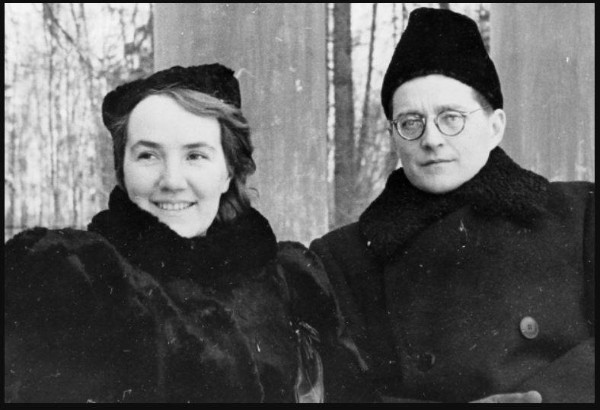
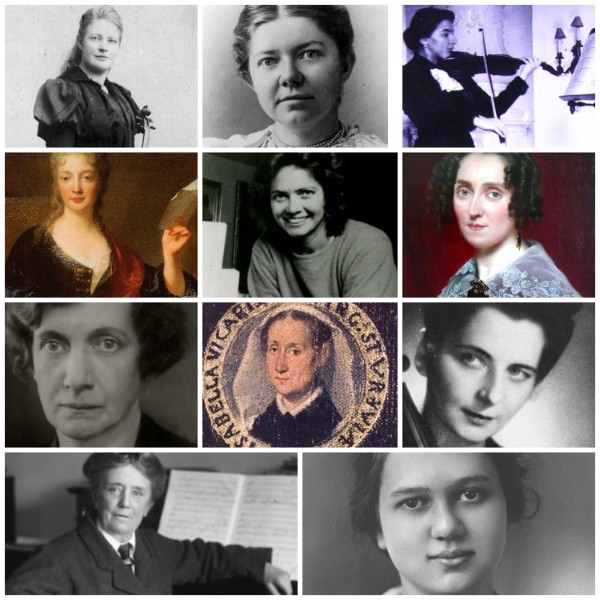
Inappropriate tile: BEST. So many “BEST” missing. you have been usually honest and smart, not hear. With all due respect, a few of the golden age are missing, and then some. Alfred Newman, Fanz Waxman, Miklos Rozsa, … then came Elmer Bernstein. This was more history than “BEST” (and…there are many BEST)